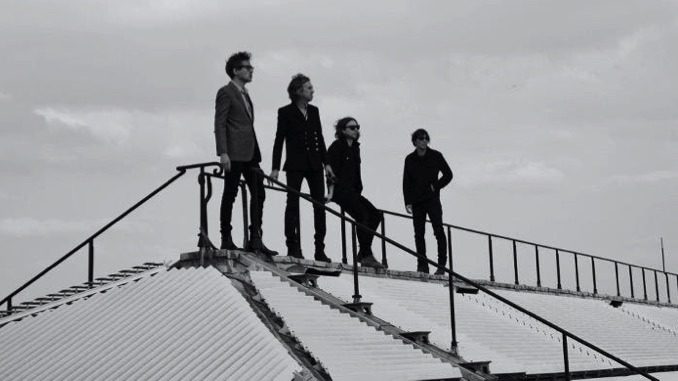For the most part, Death Cab for Cutie’s music falls into one of two camps: the scrappy, Pacific Northwest indie of their early days or the radio-ready, arena-adjacent hits of their later years. The middle point between these two poles is 2003’s Transatlanticism, a masterpiece that helped Death Cab transition from the winsome simplicity of The Photo Album into the chart-topping sounds of Plans. The group’s 10th album, Asphalt Meadows, blends these two modes of operation in a career-spanning feat. Although some of its songs lean heavily into one styling or the other, its composite package borrows from the whole gamut of Death Cab’s oeuvre, rather than one camp or the other.
That’s not to say that Asphalt Meadows lacks an identity of its own. The band’s latest work contains some of the heaviest, noisiest songs in their catalog, and it makes that clear from the outset. Opener “I Don’t Know How I Survive” starts like most Death Cab for Cutie songs would; a melodic guitar line gives way to frontman Benjamin Gibbard’s rumination on an existential dilemma: “Listen to the ringing in your ears / The scrambled voices of your fears.” By the time the chorus enters, though, a blast of cacophonous noise rings out that wouldn’t sound out of place on last year’s Low record. The BJ Burton-esque, clipping levels of volume are, generally speaking, novel to Death Cab, a band often aligned with a reclusive, bookish demeanor that you wouldn’t expect to get really fucking loud.
The Seattle stalwarts keep up the pace on the next track, lead single “Roman Candles.” In a quick, two-minute burst, Gibbard explores the ephemeral nature of joy while a growling low end lurks underneath. An ascending, distorted guitar line enters the fold shortly thereafter, and the song only keeps building upon itself from there, adding layers and layers of heaviness that contrast the soft tunefulness of Gibbard’s distinctive voice. It’s these louder moments that expand the notion of what a Death Cab for Cutie song can be. For such an established band over two decades into their career, it’s an impressive achievement, and it’s part of what makes Asphalt Meadows their best work since 2008’s Narrow Stairs.
On a similar note, it also has one of the best Death Cab for Cutie songs to date. “Foxglove through the Clearcut” switches between pensive spoken-word sections and Transatlanticism-indebted catharsis, like Cassandra Jenkins’ “Hard Drive” with loud, alt-rock guitars. Gibbard chronicles the ethnic cleansing and colonization of Indigenous peoples in the United States, evoking a quote from Cheyenne Chief White Antelope (though it’s misattributed to another Cheyenne leader, Black Kettle) to underlie the sense of placelessness that can result from occupation. The penultimate song, “Fragments from the Decade,” which features some of Jason McGerr’s most tasteful drumming this side of “What Sarah Said,” also examines how we all live on stolen land: “Days are lonely and long / Walking in place where you don’t belong / Here on paved Native lands / Time disappears from the palm of your hands.” Whereas Death Cab’s 2010s output littered some good tracks throughout, such as “Your Hurricane,” “You Are a Tourist” and “No Room in Frame,” Asphalt Meadows houses a bunch of them in one place. It makes for a more gratifying, consistent experience compared to its most recent predecessors.
Death Cab for Cutie also indulge some proggier tendencies, albeit without the classic-rock guitars they are often accompanied by. The title track (not that one) is what a Thank You for Today cut would sound like if its verses were in 10/4. Following it is “Rand McNally,” which hinges on a guitar arpeggio and gauzy synth melody in 7/8. Aside from its odd time signatures, however, it’s fairly standard late-era Death Cab fare. Parts of Asphalt Meadows draw their frames of reference from certain records more blatantly than others, such as how the title track and “Rand McNally” conjure the glossy textures of Thank You for Today. The pandemic bop “I Miss Strangers,” for instance, is a modern take on the frenetic pace of 2011’s “Doors Unlocked and Open,” right down to its themes of isolation: “These days I miss strangers more than I miss my friends / And the waves of conversations breaking on the shores of my head again.” The show-stopping centerpiece “Foxglove through the Clearcut” summons the escalation of “Transatlanticism” and “Bixby Canyon Bridge” with its towering, simmering magnitude.
The band gets even more meta on “Here to Forever,” in which Gibbard reckons with the self-doubt that can stem from major success. “I wanna know the measure from here to forever,” he sings in the chorus, reflecting on the future of his band and possibly his entire life trajectory. However tenuous it may seem, he remains a reluctant optimist: “The only way I seem to cope is by trying to hold on to hope / If just for a while.” Even if it contains a gauche line about doom-scrolling that doesn’t quite land, “Here to Forever” is a brief reminder of the slivers of hope that can peek through even the thickest clouds of cynicism.
Asphalt Meadows’ closer, “I’ll Never Give Up on You,” is a more overt affirmation. Gibbard enumerates the many things that have disillusioned him, whether they be politicians, dilettantes, affectations or mind-altering substances. He has lost his faith in so much, but he makes one exception. “I’ll never give up on you,” he sings, backed by his own vocal harmonies in a call-and-response refrain. Despite the fact that people reductively memeify them as a one-dimensional “sad boy” band, Death Cab for Cutie underscore their range and numerous eras on Asphalt Meadows. Uniting the past and the present, it’s the perfect mnemonic for this band’s legacy.
Grant Sharples is a writer based in Kansas City. He has contributed to MTV News, Pitchfork, Stereogum, The Ringer, SPIN and others. Follow him on Twitter @grantsharpies.




